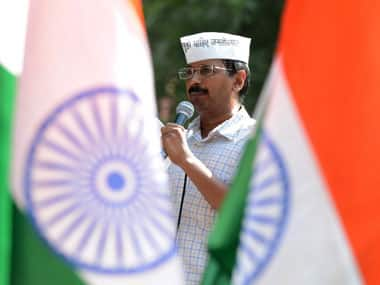When Arvind Kejriwal broke into a song, ending his speech after being sworn-in Delhi’s seventh chief minister, he sprang a surprise. Many politicians find it hard to sing the National Anthem even in chorus, but he chose the Manna Dey song from Paigam. Most in the audience, especially his activists, may not have been born when it was shown on India’s silver screen. That was in 1959. However, the words extolling brotherhood among humans, superseded the off-tune rendering. His eyes were pinched shut in the effort. [caption id=“attachment_1312489” align=“alignleft” width=“380”]  Arvind Kejriwal. AFP[/caption] Like everything from him so far has been out of step with what traditional politicians do. It was not starched khadi attire, not a nattily tailored two-piece bandhgala, sometimes adorned with a rose that are on display at swearing in ceremonies for male politicians. The sweater to beat the cold, and by now the party’s ubiquitous white cap with ‘I Am Aam Aadmi’ inscription was perhaps a deliberate dressing down for the occasion, but was also a carryover of the days of the agitation-turned-movement, now morphed into a political party. Like they say, one makes a statement with the dress. He has now become as iconic as the RK Laxman’s common man, but one better. He is not just within earshot of something profound or something ridiculous being said by the powerful but in the seat of power itself. The renowned Laxman, in his ill-health and advancing age may have stopped drawing his — balding common man with a toothbrush moustache but Kejriwal, with his deportment and accoutrement has provided a new image of the people in the lower rungs of the order. Kejriwal’s commute by metro was a message that he remained committed to be on the ground when going to be inaugurated into the city-state’s highest elected office. He had no gun-toting security men around him. If he does this often, it won’t be a tokenism. That makes him at once a person who is one amongst us. It is far removed from the earlier status of an Indian who is more a subject than be a citizen of a republic with rights and entitlements, and now, an understanding that makes them responsible as well. What the party’s identifier, the white cap, is restore some respect to what it was, a Gandhi cap. There used to be a said that such a cap hitherto only hid the nefarious stuff that was spinning in the heads of the traditional politicians. He has raised the humble broom, so essential, but consigned to a corner of the home after its purposeful use to a status of a sign of a revolution wrought. The charkha, hammer and sickle, and yes, the Congress’ bullocks with a plough were the other symbols of the past. Though critics have often described his mode as democracy of the mob, he has made it possible at least as of now, for hope to reign over the traditional cynicism of the common man that one he cast his vote; he did not count till the next round. It is quite possible that he may have bitten a lot more by his promises of an interactive government – send me an SMS, send me an email kind of appeals to the people – but his easy style seems to make people comfortable with him. In his first but informal moholla meeting yesterday outside Aam Aadmi Party’s headquarters, he just sat on a table like a student would in the classroom when the teacher was away between two lectures, and asked a simple question of a senior municipal official. Why does it take a month — according to the civic body’s claimed performance standards – to repair a broken high mast lamp? “Do it in 15 days,” he said, and urged the attendees to report to him whether it was done or not a fortnight hence. No doubt the AAP government would develop a new paradigm of governance where people would be more anticipatorily involved. It would perhaps be formalised in a practical way so that access to government is by a right not limited to cronies. Till that time, however, even as the AAP wrestles with the formal business rules of running a government, and understands the nuances of legislative procedures if the Congress does not pull the rug, the common man would demand that daily connect. How the two would be judiciously combined is going to be the toughest test of the government by people like us — surely, Robert Vadra would be rueing his derisive ‘mango people’ comment — but the energy and honesty could see that happening. Who knows? However, regardless of its future, this is a moment worth living. Savour it.
Even as the AAP wrestles with the formal business rules of running a government, and understands the nuances of legislative procedures if the Congress does not pull the rug, the common man would demand that daily connect.
Advertisement
End of Article
Written by Mahesh Vijapurkar
Mahesh Vijapurkar likes to take a worm’s eye-view of issues – that is, from the common man’s perspective. He was a journalist with The Indian Express and then The Hindu and now potters around with human development and urban issues. see more


)
)
)
)
)
)
)
)
)



